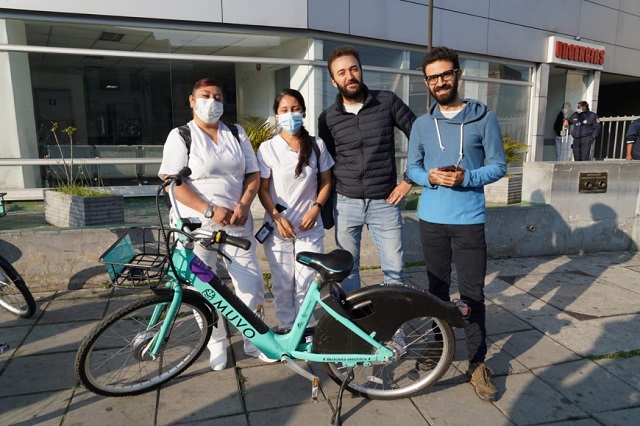
MUVO CEO Daniel Otero and COO Miguel Ocampo with health workers who are now using the company’s e-bikes to get around Bogotá. Photo by MUVO
COVID-19 is shutting down urban transportation networks around the world. But to “flatten the curve” and save lives, critical frontline health workers still need to get to work. In Bogotá, Colombia, where the city has already experimented with providing emergency bikeways, a new initiative is providing free access to an e-bike fleet for medical workers as the city begins to shut down all non-essential travel.
On March 27, medical workers across the city began to receive electric bicycles from micromobility operator MUVO to facilitate their mobility and ability to provide life-saving services. MUVO agreed to repurpose its entire fleet of 400 bicycles, giving them over for personal use for one month initially, and Despacio, a local non-governmental organization, and NUMO, the New Urban Mobility alliance, agreed to co-fund operations. The city government is coordinating logistical support.
The innovative idea sprang from an intensive four-day virtual MOVID19 Hackathon by NUMO and Datasketch, in partnership with several international and local organizations as well as the city of Bogotá. Travel is currently curtailed in Bogotá because of the COVID-19 pandemic and a citywide quarantine. Participants in the hackathon had access to resources to better understand mobility data under these new conditions, including open transport data from the city and private service operators, and were challenged to come up with creative solutions. The hackathon was hosted on Github and designed for replicability to encourage other cities to add their own data and host their own hackathons.
Of 44 total participants, 3 projects were awarded small cash prizes for their outstanding potential. The first-place winner of the hackathon designed and implemented a digital tool using data from a 2019 mobility survey to reroute transit to better serve users during the pandemic. The second and third-place winners called for providing health workers with bikes to increase their mobility and reduce their risk of contagion. They identified locations of clinics and other points of service for health care that need more flexible mobility options, and looked at the problem from the other direction by mapping where essential workers live in the city.
NUMO and Despacio saw an opportunity to build on these ideas and begin an immediate pilot project to learn more. Many medical personnel are experiencing significant mobility challenges in Bogotá. They tend to rely heavily on public transit and shared micromobility services, both of which have all but disappeared in response to reduced demand and the citywide lockdown. Providing e-bikes to workers helps fill the gap, while reducing contact with others.
Ahora sí los de @muvobike me hicieron chillar. Hoy llevando más bicis a Engativá y Simón Bolivar se encontraron con estas, que ya están despachando con las que recibieron la semana pasada. Gracias x apoyar @NUMOalliance @deespacio @SectorMovilidad @SectorSalud @nico_estupinan pic.twitter.com/pNE3zjTYyF
— Carlos Efe Pardo (@carlosfpardo) March 30, 2020
The first step was to find a provider and designate funds to cover operating costs. Now, MUVO, NUMO, Despacio and the government of Bogotá are looking for operations, logistics and financial support.
As in all responses to COVID-19, this is a rapidly evolving situation. Considerations on the table include providing health workers with permanent access to bicycles throughout the duration of the pandemic; increasing availability of secure parking places for micromobility vehicles of all kinds (scooters, cargo bikes, personal bicycles, etc.); expanding micromobility infrastructure for safer rides and faster routes that complement mass transit corridors of highest demand; and improving security, as health workers often have shifts that begin or end at night. Guidelines are also being developed to assist in replicating and communicating these efforts.
Open data and cooperation were crucial in implementing both the hackathon and this solution as rapidly and effectively as possible – one of many, we hope, to spin out from the exercise. The city’s mobility secretariat is working to integrate solutions from all three winners and other ideas from the hackathon into projects to improve data quality, integrate analysis into policy decisions and more.
For more information on the e-bike project underway in Bogotá or the MOVID19 Hackathon, please contact Carlos Pardo.
Carlos Pardo is senior manager of pilots for NUMO, the New Urban Mobility alliance, which channels tech-based disruptions in urban transport to create joyful cities where sustainable and just mobility is the new normal. NUMO is hosted at WRI Ross Center.








